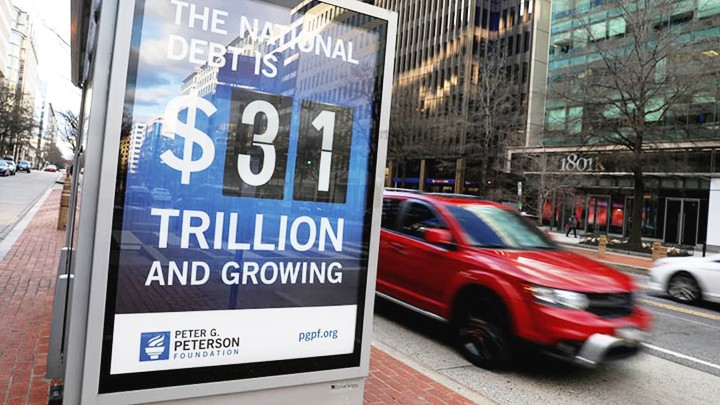Any impact from the debt ceiling deal?
It seems to be agreed that last week’s debt ceiling deal passed by Congress won’t hit the economy hard. That certainly seems true if we look at the scale of the cuts to spending in the next couple of fiscal years. However, should the economy slow significantly, the constraints on fiscal support could place an increased burden on the Fed to cut rates to get the economy moving again.

US debt clock
We certainly agree with the thrust of most analysts’ arguments that the limit s on discretionary outlays contained within the debt ceiling bill will not materially hit the economy. The limit s on this spending broadly mean that discretionary spending in FY 2024, starting October, will be about the same as the current fiscal year while FY 2025 will see an increase of 1%. Of course, these are in nominal terms and hence if inflation stays elevated the spending limit s will imply much deeper cuts in real terms.
Nonetheless, the bi-partisan Congressional Budget Office (CBO) estimates that the spending limit s mean that discretionary outlays will be around USD64bn smaller than its pre debt ceiling estimates, with this figure rising to USD107bn in FY 2025. Over the full 10-years from 2023, spending is some USD1.3tr lower. These might sound like big numbers but they are not in the context of both the huge size of the economy and the fact that spending in 2023 was actually quite generous.
From what we can tell, the average assumption concerning any hit to growth is that the bill could shave around one or two tenths of a percent off growth next year. That is not very much at all. With this in mind it might seem that all sides of the political spectrum are winners here, with the Republicans achieving a decent chunk of the spending reductions that they wanted, while the scale of the cuts should not tip the economy into a recession in an election year – which would presumably damage Biden’s re-election chances. Add all this to the positive market reaction and it looks as if there’s not a bad thing to say about the debt ceiling deal.
But is this the case? For while the deal itself might not materially harm the economy, what happens if something else does – like the aggressive policy tightening from the Fed? For if this is the case, tying one arm behind the White House’s back via discretionary spending limit s, could make the economy far more vulnerable.
We should not forget that the way in which the US economy was rescued from the pandemic was primarily through fiscal means, not monetary easing. Indeed, many argue that the stimulus, first by Trump in the wake of Covid, and then by Biden, sowed the seeds of today’s high inflation. We are not sold on this idea but, nonetheless, it does show how bold fiscal action can lift an economy quickly. But now, with limit s on discretionary spending, there are going to be serious doubts that policymakers can do this again if the economy wobbles or, worse still, another adverse shock hits.
Now we do not envisage a massive slump in the economy, but a move into a recession this year and possibly early next year still seems likely even if, as we’ve mentioned before, the recession is just a couple of quarters of negative growth and not labelled as an ‘official’ recession by the National Bureau of Economic Research (NBER). Of course, the automatic fiscal stabilisers will help to alleviate the pain, but the absence of a route to hike discretionary spending could prolong any downturn.
In this case it seems likely that a greater burden will be placed on the Fed to ease the pain provided, of course, inflation is better behaved. Hence, while the discretionary spending limit s in the debt ceiling bill won’t hit the economy hard, the bill could still have an impact and, in our view, an impact that makes treasuries look an even better buy than they did before the bill was passed.








